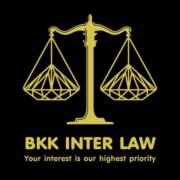Best Hiring & Firing Lawyers in Don Mueang
Share your needs with us, get contacted by law firms.
Free. Takes 2 min.
List of the best lawyers in Don Mueang, Thailand
About Hiring & Firing Law in Don Mueang, Thailand
The hiring and firing of employees in Don Mueang, a district of Bangkok, are governed primarily by Thai labor law. Both local businesses and international companies operating in Don Mueang must comply with these regulations. Laws are designed to balance the interests of both employers and employees, emphasizing fair treatment, proper employment contracts, and specific procedures for termination to avoid disputes. The process and rules apply equally across Don Mueang as in the rest of Thailand, though workplace practices may differ among industries and company sizes.
Why You May Need a Lawyer
Legal advice is valuable in many employment situations, whether you are an employer or an employee. Common scenarios in Don Mueang where legal guidance may be necessary include:
- Drafting or reviewing employment contracts to ensure compliance with the latest Thai labor regulations
- Understanding grounds for lawful termination and the correct process to avoid wrongful dismissal claims
- Resolving disputes related to unfair dismissal, redundancy, or severance pay
- Addressing workplace grievances, discrimination, or harassment claims
- Managing issues unique to foreign workers, including work permits and visa requirements
- Clarifying legal entitlements related to probation, notice periods, and contract renewals
- Representing parties in labor disputes or mediation with the Labor Court or other authorities
Engaging a lawyer who understands local practice in Don Mueang can help protect your legal rights and prevent costly errors.
Local Laws Overview
Key laws affecting hiring and firing in Don Mueang include the Thai Labor Protection Act, the Labor Relations Act, and regulations from the Ministry of Labour. Key points include:
- Employment contracts are recommended in writing, stating terms such as role, salary, benefits, probation period, and working conditions
- The Labor Protection Act sets out minimum standards on working hours, overtime, rest periods, holidays, and leave
- Termination of employment must generally be for specified causes, and proper notice or severance pay must be provided
- Notice periods are typically one full wage payment period, unless an immediate dismissal for gross misconduct can be justified
- Severance pay depends on the employee's length of service and is mandatory unless the dismissal is for serious cause
- Unlawful termination or discrimination can lead to legal claims and penalties in the Labor Court
- Foreign employees require valid work permits, and improper employment can result in fines or deportation
Employers and employees in Don Mueang must ensure they are aware of their obligations and rights under these laws to avoid disputes and legal problems.
Frequently Asked Questions
Is a written employment contract required in Don Mueang?
Although not always mandatory, a written contract is highly recommended as it provides clear evidence of agreed terms and can help prevent misunderstandings or disputes.
What notice period applies for terminating an employee?
Thai law generally requires at least one full wage cycle of notice. However, immediate termination without notice is permitted in cases of serious misconduct as defined by the law.
Is an employer required to provide severance pay on termination?
Yes, unless the employee is dismissed for serious cause such as dishonesty or negligence. The amount depends on the length of employment.
What are valid grounds for terminating an employee?
Valid grounds include repeated violation of company rules, serious misconduct, dishonesty, or permanent business closure. Redundancy due to reorganization is also recognized but must follow due process.
What can I do if I believe I was unfairly dismissed in Don Mueang?
You can file a complaint with the Department of Labour Protection and Welfare or the Labor Court. Legal action must be initiated within 60 days of termination.
How should I handle firing a foreign employee?
The same legal procedures apply, but you must also notify immigration and labor authorities to cancel the work permit and visa. Failing to do so may result in penalties.
Can an employer change employment terms unilaterally?
Changes to fundamental terms, such as salary, job role, or hours, typically require employee consent. Significant unilateral changes may be treated as constructive dismissal.
Is probation allowed, and for how long?
Probation periods are common, usually up to 119 days. Probationers enjoy many of the same legal rights as permanent staff, including notice and, in some cases, severance pay.
What protections exist against discrimination or unfair treatment?
Thai law prohibits discrimination based on gender, age, race, disability, or religion. Victims can seek remedies through the Labor Court or the National Human Rights Commission.
What steps can be taken to resolve hiring or firing disputes?
Disputes can often be resolved through direct negotiation, mediation via the Labor Relations office, or, if necessary, by filing a claim in the Labor Court.
Additional Resources
- Department of Labour Protection and Welfare - provides guidance and handles complaints regarding employment issues
- Ministry of Labour - offers resources on hiring, firing, and labor standards applicable in Don Mueang
- Don Mueang District Office - can direct you to local legal aid or mediation services
- Legal Assistance Centers - some local universities and non-profits provide free or low-cost legal advice for employment matters
- Thai Labor Court - handles claims relating to unfair dismissal or employment disputes
Next Steps
If you need legal assistance with hiring or firing matters in Don Mueang, consider the following:
- Gather all relevant documents, such as employment contracts, pay slips, warning letters, and termination notices
- Make a list of the issues or questions you have regarding your situation
- Contact a qualified lawyer or a local legal assistance center with experience in Thai employment law
- Consult with the Department of Labour Protection and Welfare for initial guidance or to lodge a complaint
- If necessary, prepare to attend mediation or legal proceedings with professional representation
Act promptly, as there are specific time limits for raising employment disputes or filing legal claims in Thailand. Seeking expert advice early on can help secure a favorable outcome and protect your rights.
Lawzana helps you find the best lawyers and law firms in Don Mueang through a curated and pre-screened list of qualified legal professionals. Our platform offers rankings and detailed profiles of attorneys and law firms, allowing you to compare based on practice areas, including Hiring & Firing, experience, and client feedback.
Each profile includes a description of the firm's areas of practice, client reviews, team members and partners, year of establishment, spoken languages, office locations, contact information, social media presence, and any published articles or resources. Most firms on our platform speak English and are experienced in both local and international legal matters.
Get a quote from top-rated law firms in Don Mueang, Thailand — quickly, securely, and without unnecessary hassle.
Disclaimer:
The information provided on this page is for general informational purposes only and does not constitute legal advice. While we strive to ensure the accuracy and relevance of the content, legal information may change over time, and interpretations of the law can vary. You should always consult with a qualified legal professional for advice specific to your situation.
We disclaim all liability for actions taken or not taken based on the content of this page. If you believe any information is incorrect or outdated, please contact us, and we will review and update it where appropriate.









